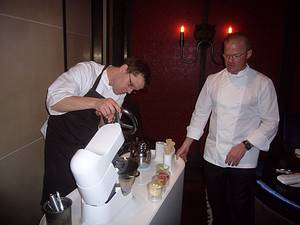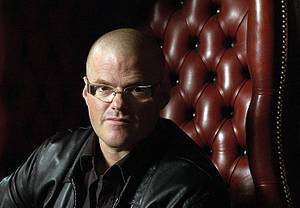Jan Moir Are You Ready To Order
Can a chef be too successful? It is something Heston Blumenthal worries about. Only two days after his new restaurant, Dinner opened in London, the 110-seat space was booked solid for the next three months.
People are practically beating the door down to get in. They are slavering in the streets, desperate to be the first to try Blumenthal’s new historical British recipes; his 18th century turkey pudding with girolles and cockscomb, his cockle ketchup, his pig’s ear stew and his roast marrow bones.
For out there on the wilder shores of gourmet adoration, the average Heston devotee is more of a serious stalker than a mere foodie fan. ‘It is crazy,’ says Blumenthal, as he walks between the tables in his crisp chef’s whites, a frown cleaving his brow. ‘The hype has been incredible. I just hope people are not expecting too much.’
 Perhaps it is too late to manage expectation now. In the frist week, the front page of one broadsheet newspaper wondered if Dinner was already ‘the best restaurant in the world?’ Perhaps it is too late to manage expectation now. In the frist week, the front page of one broadsheet newspaper wondered if Dinner was already ‘the best restaurant in the world?’
Inside, the critic foamed on about his reaction to one dish (‘A gasp, and then a laugh, and then a wonderful taste’) before describing a brioche bun as tasting like it was ‘soaked in angel’s spit and spiked with the sugar of unicorn’s horn’. Another critic was merely content to describe the restaurant as ‘astonishing’.
That’s what Blumenthal does to people. Nearly 16 years after he opened his first restaurant, the celebrated Fat Duck in Bray, Heston Blumenthal has become that rarest of creatures; a chef who has managed to become a household name without diluting the essential outlandishness of his core offering.
Somehow, his Willy Wonka style of cooking, his snail porridge and his bacon and egg ice creams, sit happily alongside his experimental television shows and his more pragmatic association with Waitrose.
Indeed, last Christmas, the Christmas pudding he conceived for the supermarket — the recipe featured a surprise orange which self-caramelised inside — was a sell-out. Some enterprising souls even put the much sought-after Heston puddings on the auction site, eBay.
‘At one stage, they were on sale for £1,000 each,’ says Blumenthal. ‘Then a lot of people thought, forget eating it, at that price we’ll sell ours too. So the market was flooded and the price dropped again. You know, it was such a hit that sometimes I worry that I’m going to be remembered as that Christmas pudding bloke and nothing else.’
Maybe not quite. Particularly as the 44-year-old chef now reluctantly finds himself back on eBay again. ‘Someone has booked a table here and put it up for auction on eBay already,’ he says, and laughs, unsure whether to be delighted or concerned by the flame-grilled heat of the sudden attention.
So what is all the fuss about? Well, although Blumenthal has the Fat Duck and two pubs (all in the village of Bray in Berkshire), this is his first venture into the capital, and has been much anticipated for years.
The meat is sourced from a prized breed of Spanish pig — but I wonder if even Henry VIII himself might quibble at £28 for a pork chop with cabbage
Dinner is situated on the ground floor of the Mandarin Oriental Hyde Park hotel in Knightsbridge and both the robust, macho leather and wood decor and the taste bud-boggling menu is the result of Blumenthal’s increasing fascination with historical British recipes.
The menu, which he has worked on for 18 months and which will change four times a year, contains dishes from the 14th to 19th centuries, with a few items (baked lemon suet pudding, cod in cider) from the last century chucked in to leaven the mix.
‘To be honest, I would rather just study food than open restaurants,’ said Blumenthal, whose interest in historical cuisine first surfaced in his popular 2009 Channel 4 television series Heston’s Feasts.
 Back then, Blumenthal recreated Medieval, Tudor and Victorian banquets where he force-fed captive, celebrity guests the likes of honeyed dormice, cock’s testicles in gold leaf and pig’s-nipple scratchings. Back then, Blumenthal recreated Medieval, Tudor and Victorian banquets where he force-fed captive, celebrity guests the likes of honeyed dormice, cock’s testicles in gold leaf and pig’s-nipple scratchings.
Here at Dinner, Blumenthal has reined in some of his mad professor tendencies and kept to the type of British dishes that most modern Britons might actually want to eat.
To this end, lamb broth, roast scallops and a savoury porridge made with cod cheeks feature among the starter dishes, while main courses include spiced pigeon with ale and artichokes, and Black Foot pork chop roasted in a wood oven.
Yes, the meat is sourced from a prized breed of Spanish pig — but I wonder if even Henry VIII himself might quibble at £28 for a pork chop with cabbage. In these very early days, we tried a hit and miss selection of dishes from a menu that costs around £100 for two, excluding wine (there is also a three-course set lunch for £28).
The best is a starter called Rice & Flesh, with nuggets of richly flavoured calf’s tail floating on an intense, savoury kind of risotto Milanese, stiff with saffron and goodness. According to Blumenthal’s research, the dish was actually invented here, not in Italy.
And yes, that brioche. It is amazing, with a uniquely fluffy, puffy texture. It is served with spit-roast pineapple, cooked on a giant contraption based on ye olde English design and especially made for Blumenthal by the watchmakers Ebel.
Apparently, this is what happened back in the mists of time. ‘The French call the English Rosbifs not because we like roast beef,’ says Blumenthal. ‘Back in those days, we were experts at roasting meats on spits which were made by watchmakers. The French used to send their chefs over here to learn from us.’
That’s the good news. The bad news is that for the main course, the ‘Powdered Duck’ legs seem to have been given some kind of turbo pamper and have been plucked, bathed, glazed and lacquered beyond recognition. It seems a lot of trouble for a muted taste experience.
The Beef Royal, the recipe apparently from a 1716 cookbook, features a short rib of Angus beef which has been slow-cooked in a bag in a ‘water bath’ for 72 hours, and is served with smoked anchovy and onion.
This hibernate-in-the-bag is one of Blumenthal’s culinary trademarks, a technique which — I’ve always thought — sacrifices texture for something supposed to be a richer flavour. Still, as Popeye used to say, ‘youse either likes your meat mushy or youse don’t’.
My least favourite dish was the salamagundy: chicken oysters — a sort of chickeny armpit — served with bone marrow, horseradish cream and salad. One word. Why?
Never mind, here comes the ice cream trolley. Designed by Blumenthal at his Willy Wonkiest, it is made from the synthetic material corian at a cost of £25,000. The contraption makes instant ice cream by turning a hand crank to mix pluming liquid nitrogen with vanilla custard.
It is a sensation, along with something called meat fruit, already destined to be the restaurant’s signature dish. ‘It is the most popular dish so far,’ says Blumenthal. ‘It is the one everyone wants.’
And it is remarkable. Priced at £12.50 on the starter menu, the meat fruit appears at first glance to be a perfectly formed small orange, sitting innocently on a wooden board. It’s even got a dimpled citrus skin, just like a tangerine. Yet cut into it and you find that the ‘peel’ is actually a thin skin of savoury orange jelly and the interior is a ball of smooth, chicken liver parfait.
His interpretation of the dishes of merrie old England is a brilliant and original concept . . . But more interesting than delicious
Eating the delicacies that Tudor kings might once have feasted on, while sitting under the great, cast iron chandeliers, each one modelled on the rose window of Westminster Abbey, is quite an experience. Particularly when it is rumoured that Blumenthal might be cooking for another king-to-be.
This week, one magazine suggested that he is to cook the wedding breakfast for Prince William and Kate Middleton. ‘Not true,’ says Blumenthal’s office, although there is a royal connection. In 2009, Prince Philip did take his staff to the Fat Duck as a Christmas treat.
Meanwhile, the bookings continue to pour in. Blumenthal has turned down offers to open a Fat Duck in China, saying he can never replicate the Bray original and will never try to do so — although he does not rule out more branches of Dinner.
Even so, they hype can be misleading. Despite reports, Dinner is not the best restaurant in the world. In fact, it’s not even the best restaurant in Knightsbridge.
For that, I would suggest you walk across the street and book a table in Pierre Koffmann’s excellent restaurant in the Berkeley Hotel — and you won’t have to wait until May to get in.
Heston Blumenthal’s interpretation of the dishes of merrie old England is a brilliant and original concept. Yet eating at his new restaurant remains an interesting experience, rather than a delicious one.
- Dinner at the Mandarin Oriental Hotel, Knightsbridge, London SW1. Tel: (0)20 7201 3833.
|


Bookmark this article with: